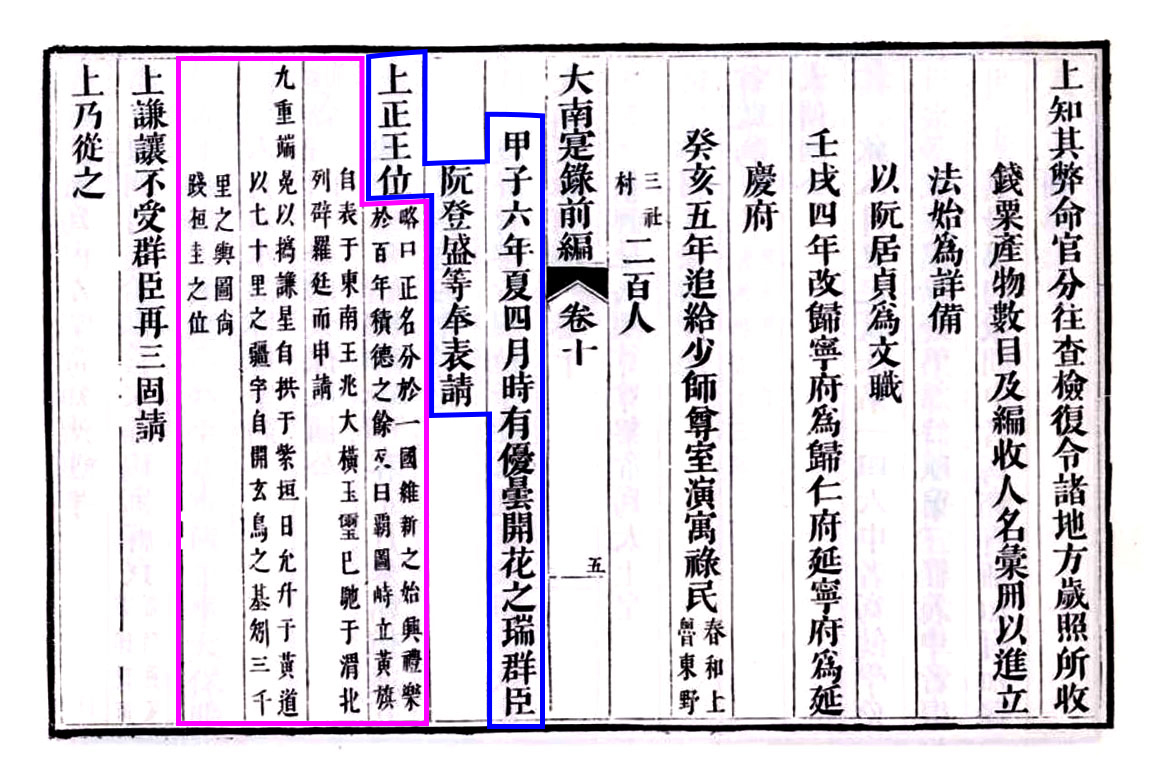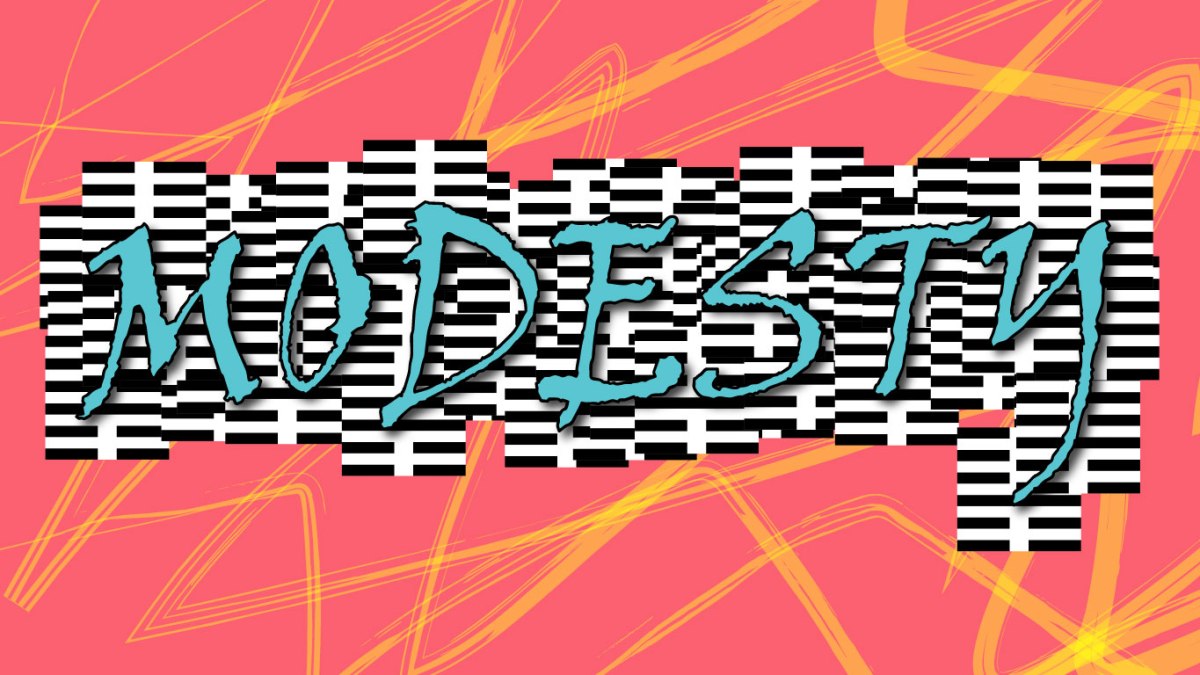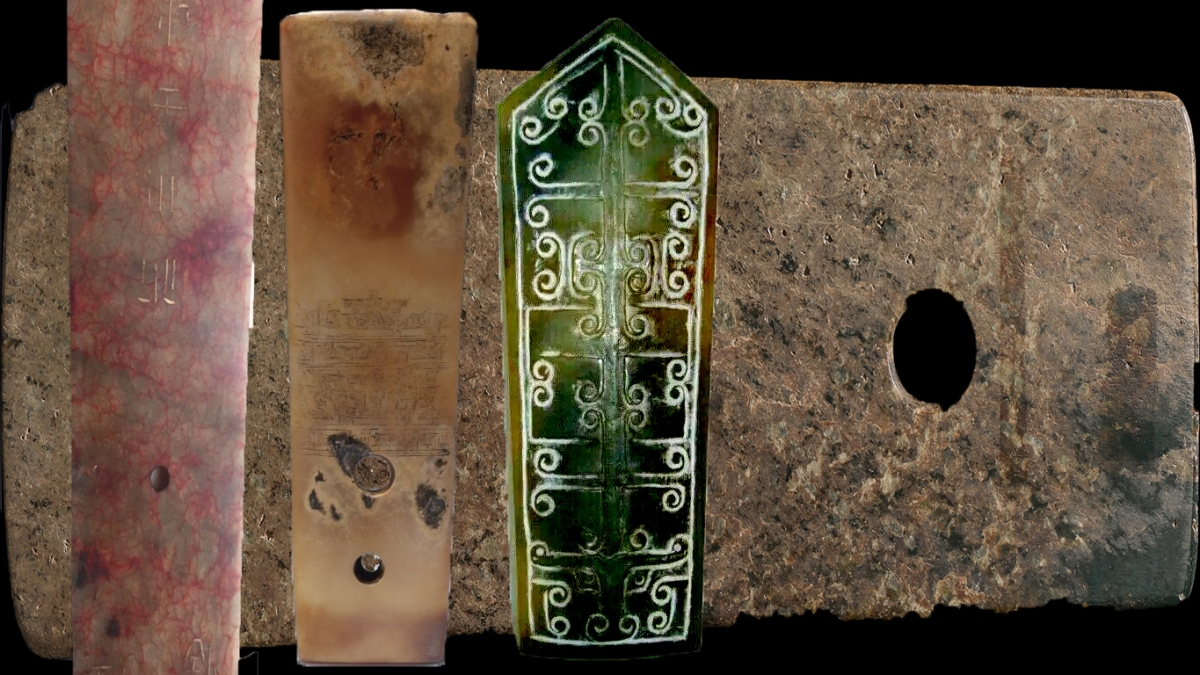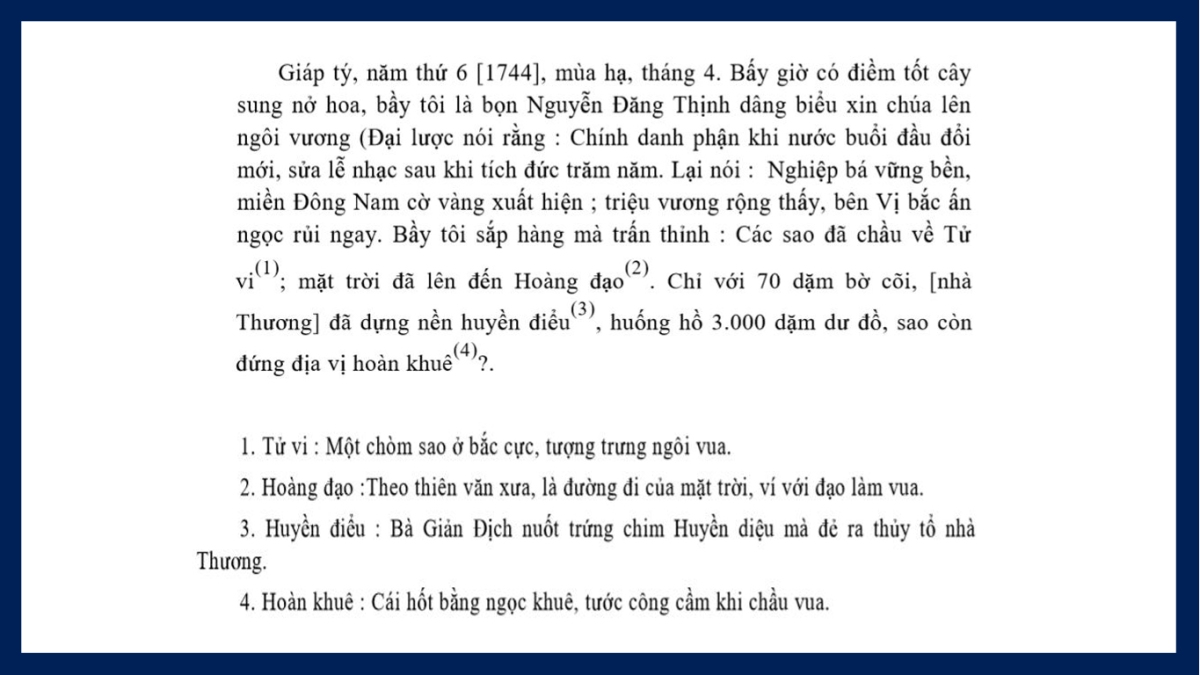According to the official chronicles of the Nguyễn Dynasty, the Đại Nam thực lục (hereafter ĐNTL), in 1744 Nguyễn Đăng Thịnh, an official in Đàng Trong, presented a petition to his ruler, Nguyễn Phúc Khoát, the “Nguyễn lord” of Đàng Trong, encouraging him to “rectify the princely position,” or more simply put, to assume the title of “prince.”
In fact, however, this does not appear to be what Nguyễn Đăng Thịnh actually did.
From the way that the ĐNTL is structured, we can see that there are two types of information about this event. The section in blue below contains the information that says that Nguyễn Đăng Thịnh petitioned the ruler to “rectify the princely position.”
That information was written by a person in the nineteenth century who contributed to the project of compiling this chronicle.
The information written in smaller characters, and surrounded by the pink line below, is supposed to come from the actual petition that Nguyễn Đăng Thịnh wrote in 1744.
Only parts of that document are quoted here, and in the previous two posts we have looked at two passages. Both of those passages employed imperial imagery. The lines that follow have even more terms that denote an emperor.

We can see this immediately in the first two lines:
“The officials (liệt tích 列辟) array themselves at court and request that,
“The ninth layer [don] the dark robes and cap and fly the banner of modesty.”
列辟羅廷而申請, Liệt tích la đình nhi thân thỉnh,
九重端冕以撝謙。 Cửu trùng đoan miện dĩ huy khiêm.
“Ninth layer” (cửu trùng 九重) is a term for the emperor. In the East Asian cultural tradition, Heaven supposedly had nine layers, and the emperor as the highest person in the realm was likened to the highest layer of Heaven, the “ninth layer.”
Further, as the highest person in the realm, only the emperor was allowed to wear the “dark robes and cap” (đoan miện 端冕), a term that first appears in the ancient Record of Rites (Liji 禮記).
Finally, as the most morally upright person in the realm, the emperor could “fly the banner of modesty” (huy khiêm 撝謙), or “stir up modesty,” as this expression is sometimes translated.
This expression comes from the Classic of Changes (Yijing 易經) where it is used in the commentary on the hexagram Qian 謙, meaning “modesty.” Essentially the point of the commentary on this hexagram is that the ultimate behavior for people in positions of superiority, such as an emperor, is to act with modesty.

In premodern East Asia it was believed that if there was an emperor who was upright and ruled with modesty, that this would be marked by some kind of favorable signs in the celestial sphere.
Nguyễn Đăng Thịnh addressed such beliefs by talking about how the celestial world would respond to Nguyễn Phúc Khoát’s donning of the dark robe and cap of an emperor. To quote, he said that:
“The stars will automatically revolve around the Purple Enclosure;
“The sun will rightly rise along the Yellow Path.”
星自拱于紫垣, Tinh tự củng vu Tử viên,
日允生于黃道。 Nhật duẫn sinh vu Hoàng đạo.
The “Purple Enclosure” (Tử viên 紫垣), also known as the “Purple Forbidden Enclosure” (Tử vi viên 紫微垣), is an area of the sky near the celestial north pole. When viewed from the northern hemisphere, stars appear to revolve around this spot.
Meanwhile the “Yellow Path” (Hoàng đạo 黃道) is the ecliptic, the path that the sun appears to follow in the sky.
On the one hand, these two lines are saying that the celestial realm would respond positively by continuing to operate in normal ways, but the first line also has imperial connotations.
Just as vassal states all surround an imperial center, so does the Purple Enclosure occupy a central place in the sky, surrounded by stars, and therefore it came to symbolize the imperial center – the capital, where the emperor resided, surrounded by his kingdom and vassal states.
Finally, Nguyễn Đăng Thịnh went on to make a comparison between the ancient Shang Dynasty empire and the type of empire that he felt Nguyễn Phúc Khoát could create. To quote:
“With 70 leagues of territory, [the Shang] developed the foundation of the dark bird (huyền điểu chi cơ 玄鳥之基),
“Even more so is the case with 3,000 leagues of terrain, and yet [you are] still occupying the position of an audience tablet [holder] (hoàn khuê chi vị 桓圭之位).”
以七十里之疆宇, Dĩ thất thập lí chi cương vũ,
自開玄鳥之基, Tự khai huyền điểu chi cơ,
矧三千里之輿圖, Thẩn tam thiên lý chi dư đồ,
尚踐桓圭之位。 Thương tiễn hoàn khuê chi vị.
I’m not sure where the “seventy leagues” number comes from, but the term “dark bird” (huyền điểu 玄鳥) is surely a reference to the Shang dynasty, as the founder of the Shang lineage was reportedly conceived when a dark bird dropped an egg in his mother’s mouth.
Then in the second line the term “audience tablet” (hoàn khuê 桓圭) refers to a kind of tablet that vassal lords would traditionally hold when they met with the emperor.
Depending on their rank, the vassal lords would have different types of tablets, and when they had an “audience,” or meeting, with the emperor, they would look at their “audience tablets” rather than look at the emperor, which was considered disrespectful.
So what Nguyễn Đăng Thịnh appears to have been saying in these two lines was that the Shang Dynasty began from a small amount of territory, whereas Nguyễn Phúc Khoát controlled much more land, and yet he was continuing to serve the Lê Dynasty by maintaining his position as an “audience tablet [holder].”

Let us now look at all of the passages from Nguyễn Đăng Thịnh’s petition and the comments that introduce it (the introductory comments are in bold):
The sixth year [of Nguyễn Phúc Khoát’s reign], a giáp tý year [1744], the fourth lunar month of summer: At that time there was an auspicious sign of an udumbara tree blossoming. Nguyễn Đăng Thịnh and other officials presented a petition requesting that His Highness (Thượng 上) rectify the princely position.
It more or less said:
Rectifying names and duties in a kingdom is the starting point of renewal;
Establishing rites and music for an age will accumulate moral virtue in excess.
It also said:
With the establishment of hegemonic intention, the yellow flag revealed itself in the southeast; With royal marks [indicating] the grand transversal, the imperial jade seal rushed to the north of the Wei.
The officials array themselves at court and request that,
The ninth layer [don] the dark robes and cap and fly the banner of modesty.
The stars will automatically revolve around the Purple Enclosure;
The sun will rightly rise along the Yellow Path.
With 70 leagues of territory, [the Shang] developed the foundation of the dark bird,
Even more so is the case with 3,000 leagues of terrain, and yet [you are] still occupying the position of an audience tablet [holder].

What the language here makes very clear is that Nguyễn Đăng Thịnh and others were requesting that Nguyễn Phúc Khoát declare himself to be an emperor.
We’ll start looking in the next post at how Nguyễn Phúc Khoát responded to this request.

